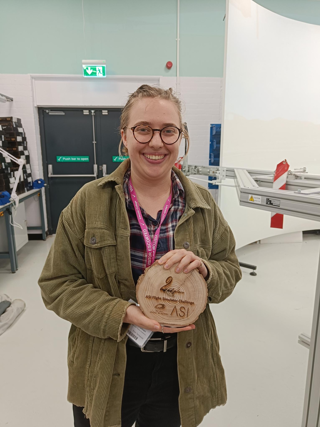
Pathways to Space: Leaving School at 16
- 20th Oct 2023
- Author: Grace Davis
Em Truman returns with our blog series Pathways Into Space, exploring the huge variety of ways you can make space part of your future...

If you’re interested in working in the space sector but don’t think staying at your school is the right choice, there are plenty of other great options. In the UK you do have to stay in one of the following until you’re 18: full-time education, an apprenticeship, or a traineeship. This post offers a brief overview of some of the popular options, future posts will revisit each one in more detail so keep an eye out!
I think I’d be very unpopular with my colleagues if I didn’t talk about our Space Engineering enhanced A-Level as your first option. Enhanced A Levels are often taught at colleges rather than schools or sixth form centres, and many combine A Level and BTEC options. Here at the National Space Academy, we work with Loughborough College to deliver the only Space Engineering enhanced A Level in the country. Our course combines a BTEC Level 3 diploma in Engineering with A Levels in Maths and Physics, all taught through a space context. Other colleges across the UK may offer other combinations of A Levels and BTECs together, they often aren’t offered as a set package, like the Space Engineering course, but that gives you more flexibility to pick the topics that work best for you.
Similar to studying advanced A Levels at college, some colleges offer traditional A Level courses. Colleges offer the same types of qualifications as sixth forms do, but they usually offer a wider range of subjects and course types. As many sixth forms are linked to secondary schools, some students feel college gives them more freedom than you get in sixth form.
The exact combination of subject available will change between every college, and the subjects you want to study may not be available everywhere, so as always, look at all your options. Both traditional and enhanced A Levels leave plenty of career path options open to you, so they’re a good choice if you think university might be the next step you want. However, A Levels all require exams, so they won’t be the right choice for everyone.

If exams are not your thing, and you prefer coursework and vocational training, then check out BTEC options. Some schools and sixth forms offer BTECs, and most colleges will offer BTEC courses and vocational courses. Most universities these days will accept students with level 3 BTEC qualifications but, if university is your next step, do check the entry requirements for the courses that you’re interested in.
Recently, the new T Level qualifications have been introduced. T Levels are equivalent to three A Levels, are open to anyone aged 16-19 and will combine traditional classroom study with hands on experience. The 45-day industry placement included in a T Level course means you can progress through into university study, a higher apprenticeship or straight into a job.
If you’d like to fast track your university education, there are a few options you can start at 16. The most well-known are HND/HNC, which are two-year courses where you will receive a Higher National Diploma or Higher National Certificate.

These are designed to be equivalent to two thirds of a university degree, and they can open the door to many jobs. It’s also common for universities and colleges to offer a one-year top-up for your HND to turn it into a full bachelor's degree. Not every institution offers HNDs or the top up qualifications so it’s a good idea to check your local options first.
